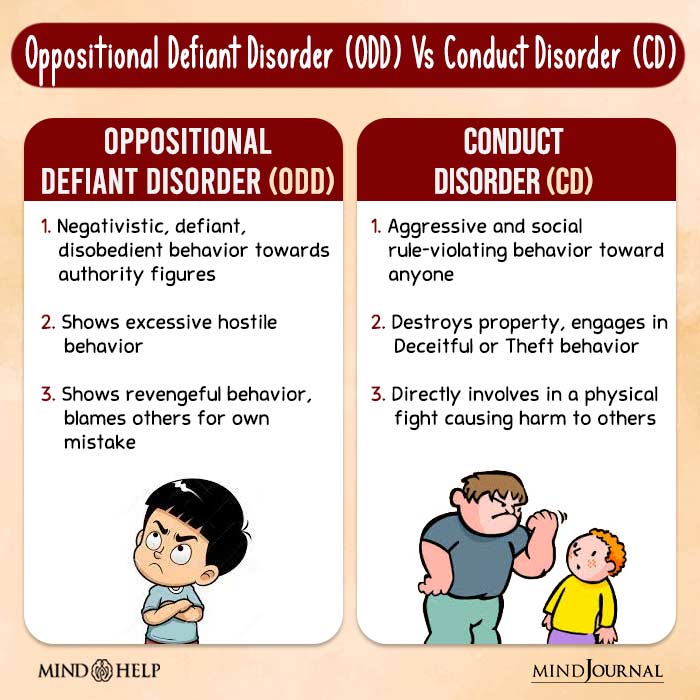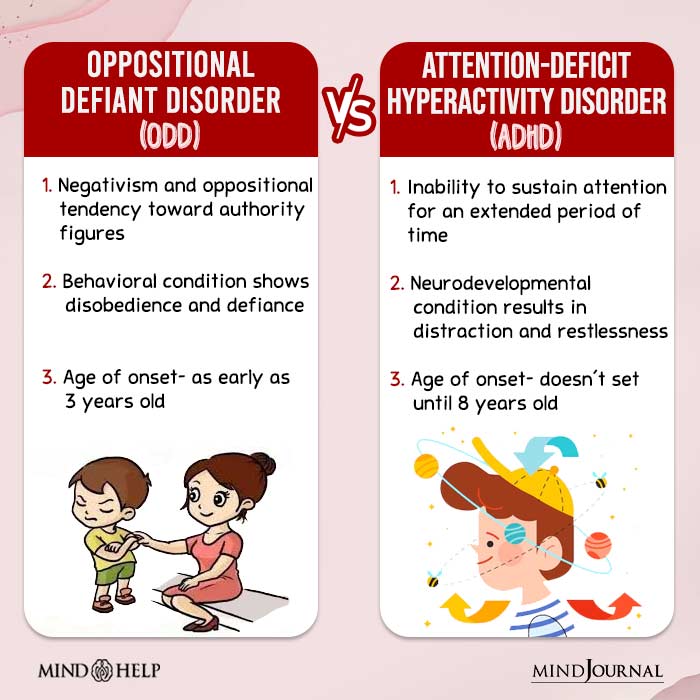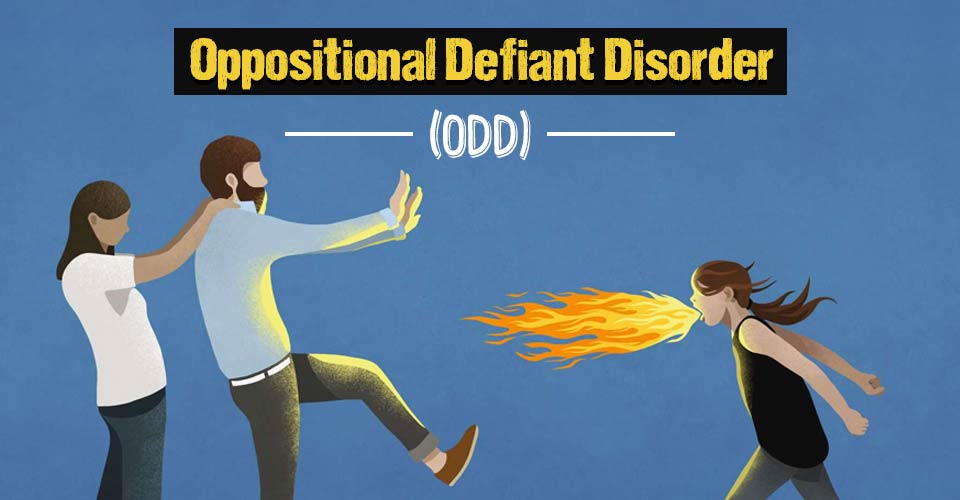Table of Contents
Oppositional Defiant Disorder (ODD) refers to the persistent and ongoing pattern of a child being disruptive, defiant, and ill-mannered toward authoritative figures—including parents or family members in charge of the child.
What Is Oppositional Defiant Disorder (ODD)?
Oppositional defiant disorder (ODD) is a behavioral disorder in which a child displays a continuing pattern of uncooperative, defiant, and hostile behavior toward people in authority. This behavior disrupts the child’s usual day-to-day functioning and social relationships.
While it is not unconventional for children to start crying or have sudden outbursts, if he/she has a persistent pattern of sudden outbursts, argumentativeness, or vengeful tendencies, being argumentative or vengeful—he/she may be suffering from ODD. The symptoms must last for at least six months 1 Ghosh, A., Ray, A., & Basu, A. (2017). Oppositional defiant disorder: current insight. Psychology research and behavior management, 10, 353–367. https://doi.org/10.2147/PRBM.S120582 in order to be diagnosed as a disorder.
Case Example
Rohan was becoming increasingly stubborn and rigid in the last 3-4 months. A usually quiet child, Rohan had started expressing impulsive and disobedient behavior at home ever since he was promoted to 4th standard.
Whenever he was reprimanded for his bad behavior by his mother, he acted out blaming her for his actions. He would intentionally disobey his parents and would constantly argue with them.
Even at school, he refused to follow instructions and would blatantly disrespect his teachers. If any of his classmates complained about his behavior, he would immediately pick a fight with them.
Case Analysis
Rohan clearly and purposefully opposed instructions given by his authority figures (parents, teachers) and also showed irritability and aggressive outbursts.
Rohan’s behavior was not only argumentative and defiant but his temper tantrums prominently showed that he was vindictive by nature, all of which reflect significant signs of Oppositional Defiant Disorder (ODD).
Prevalence Of Oppositional Defiant Disorder
Research reveals 2–16% 2 Aggarwal, A., & Marwaha, R. (2022). Oppositional Defiant Disorder. In StatPearls. StatPearls Publishing. Available from: https://www.ncbi.nlm.nih.gov/books/NBK557443/ of children and teenagers suffer from ODD, with the typical age of onset being 8 years. In younger children, ODD is more common in boys. In older children, it happens about equally in boys and in girls.
With a proper diagnosis, the symptoms of oppositional defiant disorder abate. However, if untreated, children with ODD can develop a more serious behavior disorder called conduct disorder.
Signs Of Oppositional Defiant Disorder
The common oppositional defiant disorder symptoms 3 Boat, T. F., Wu, J. T., Committee to Evaluate the Supplemental Security Income Disability Program for Children with Mental Disorders, Board on the Health of Select Populations, Board on Children, Youth, and Families, Institute of Medicine, Division of Behavioral and Social Sciences and Education, & The National Academies of Sciences, Engineering, and Medicine. (2015, October 28). Clinical Characteristics of Oppositional Defiant Disorder and Conduct Disorder. Nih.gov; National Academies Press (US). Available from: https://www.ncbi.nlm.nih.gov/books/NBK332890/ include:
1. Anger and irritability
Children or adults with ODD are often angry and resentful. They are touchy, frequently losing their temper over the smallest of issues.
Read More About Anger Here
2. Argumentative and defiant behavior
People with ODD, especially children, tend to argue excessively and refuse to comply with requests and rules. They are constantly blaming others for their own problems and mistakes.
3. Vindictiveness
Oppositional defiant disorder in adults and children tends to make people unhealthily respond to criticism. They are also spiteful and vengeful frequently and persistently, saying mean and hateful things when angry or upset.
Types Of Oppositional Defiant Disorder
There are three types 4 Roetman, P. J., Siebelink, B. M., Vermeiren, R. R. J. M., & Colins, O. F. (2021). Classes of Oppositional Defiant Disorder Behavior in Clinic-referred Children and Adolescents: Concurrent Features and Outcomes: Classification Des Comportements Dans le Trouble Oppositionnel Avec Provocation Chez Des Enfants et des Adolescents Aiguillés à Une Clinique: Caractéristiques Co-occurrentes et Résultats. Canadian journal of psychiatry. Revue canadienne de psychiatrie, 66(7), 657–666. https://doi.org/10.1177/0706743720974840 of oppositional defiant disorder:
1. Stimulus-dependent ODD
In this type of ODD, sufferers also experience the symptoms of attention-deficit-hyperactivity disorder (ADHD).
2. Cognitive overload ODD
Children with this type of oppositional defiant disorder experience learning and other intellectual difficulties. They also suffer from severe anxiety and social awkwardness.
3. Fearful ODD
People with this type of ODD experience great intensities in stress, irritability, and rage.
Read More About Stress Here
Oppositional Defiant Disorder Vs Conduct Disorder
Both oppositional defiant disorder and conduct disorder are common behavioral disorders with control issues. However, the main difference between ODD and conduct disorder is that the child with ODD only opposes whatever he/she is asked to do—frequently showing negativity in almost every reaction.
But in conduct disorder, the child engages in activities that seem to violate the social norms. In fact, in the latter, the child is more prone to unethical conduct than a child with ODD.

Read More About Conduct Disorder Here
Oppositional Defiant Disorder Vs ADHD
The main difference between ODD and ADHD is that a child with ODD shows constant negativism and the tendency to oppose instructions from parents, teachers, friends, or other people around him/her. But in ADHD, the child experiences an inability to concentrate and sustain attention for an extended period of time.
ODD is also a behavioral condition in which a child displays a continuing pattern of uncooperative, defiant, and sometimes hostile behavior toward people in authority.
On the other hand, ADHD is a neurodevelopmental disorder that causes a child or an adult to be easily distracted, disorganized, and excessively restless.
Moreover, the symptoms of ADHD have their onset as early as 3 years of age. Oppositional defiant disorder, on the other hand, does not set in until 8 years of age.

Read More About ADHD Here
Oppositional Defiant Disorder In Children
Oppositional defiant disorder commonly affects children and adolescents. The symptoms of oppositional defiant disorder in kids include:
- Frequent temper tantrums
- Vehement arguing with adults
- Active defiance of adult authority, rules, and requests
- Deliberately annoying or upsetting people
- Placing blame on others for one’s own mistakes or misbehavior
- Often being touchy or easily annoyed by others
- Harboring frequent anger and resentment
- Being spiteful and revengeful
Having only one of the many symptoms of ODD doesn’t necessarily mean that a child has developed the disorder. Multiple patterns of maladaptive behavior have to persist for at least a duration of 6 months for the diagnosis of oppositional defiant disorder.
Oppositional Defiant Disorder (ODD) In Adults
ODD, if untreated in childhood, can grow severe into adulthood. The common symptoms of ODD in adults include:
- Persistent anger and frustration
- Feeling misunderstood or unlikeable
- Extreme dislike towards authority figures such as supervisors at work
- Identification as a rebel
- Unhealthy approach toward feedback and criticism
- Displaying passive-aggressive behavior
- Relentless self-defense at all cost
- Constant blaming of others for one’s own mistake
It is often extremely difficult to diagnose this disorder in adults since many symptoms overlap with other mental health disorders, including chronic antisocial behaviors or substance abuse.
Oppositional Defiant Disorder In Adult Relationships
Adults with oppositional defiant disorder persistently and frequently experience intimacy issues with their partners and family members. They fail to cooperate and constantly argue with their coworkers and family members.
They often lose their tempers and engage in volatile and conflict-ridden behavior. Most of the time, they direct their actions towards deliberately upsetting their peers. They often play the blame game and are accustomed to putting forth conceited, passionate self-defenses.
What Causes Oppositional Defiant Disorder?
The exact cause of this disorder is still unknown. There may be a combination of environmental, genetic, psychological, and other causes 5 Boylan K. (2014). The many faces of oppositional defiant disorder. Journal of the Canadian Academy of Child and Adolescent Psychiatry = Journal de l’Academie canadienne de psychiatrie de l’enfant et de l’adolescent, 23(1), 8–9. that may trigger the symptoms. The common oppositional defiant disorder causes include:
- Genetic heritability
- A family history of mental health conditions (like mood disorders, personality disorders, ADHD, anxiety disorders, substance abuse, etc.)
- Dysfunctional neurotransmitters
- Childhood maltreatment and trauma
- Parental neglect and abuse
- Dysfunctional family life (like experiences of domestic violence)
Diagnosis Of Oppositional Defiant Disorder
The diagnosis of adjustment disorder usually involves:
- The identification of the symptoms the individual is experiencing
- How the symptoms are impacting his/her ability to function daily and social relationships
A mental health professional (MHP) diagnoses the patient following some specific criteria outlined in psychiatric manuals. An MHP also delves into the patient’s medical, mental, and social history.
After careful evaluation, the MHP devises a treatment plan to ease the symptoms of this disorder. Psychoeducation and social skills training are also provided to the sufferer to inform him/her about how to treat oppositional defiant disorder on one’s own.
Treatment For Oppositional Defiant Disorder
The common oppositional defiant disorder treatment methods 6 Fraser, A., & Wray, J. (2008). Oppositional defiant disorder. Australian family physician, 37(6), 402–405. include:
1. Cognitive-behavioral therapy
This therapy is used to evaluate and understand the thoughts and patterns that govern negative behavior. These thoughts and patterns are then replaced with positive thoughts and patterns that produce the desired outcome.
The psychologists will work with the children to improve their anger management skills, communication, impulse control, and problem-solving skills. They will also be guided to identify the potential factors that trigger their behavior.
Read More About Cognitive Behavioral Therapy Here
2. Family therapy
This therapy involves working together as a family and resolving conflicts together. This can help the parents to support their child and learn strategies for handling their child’s mental health condition.
3. Parent-child interaction therapy
The therapist will coach the parents to learn how to interact with their children. With this therapy, parents can learn effective parenting techniques to ensure that their child has a healthy childhood.
4. Peer group therapy
The child learns and improves their social skills and relationships with their peers in this therapy. It involves communicating and building healthy relationships with peers. It also involves moving away from negative peer pressures and getting associated with a positive group of peers.
5. School-based interventions
Supportive interventions aimed at improving school performance, peer relationships, and problem-solving skills are useful in the treatment of ODD.
This may include education, specific tools for the teacher to improve classroom behavior, group activities to facilitate adherence to classroom rules and acceptable social norms, etc.
6. Pharmacological therapy
There are no specific medications to treat this condition. However, other associated mental health conditions with ODD such as depression or ADHD may be treated with medications.
In case of severe emotional dysregulation or aggression, risperidone has proven effective in controlling aggressive behaviors. If the aggressive behaviors continue to persist then mood stabilizers such as lithium or carbamazepine may also be prescribed by the doctor.
Dealing With Oppositional Defiant Disorder As Parents
Therapy is important for a child suffering from ODD, but it is also important for parents to learn how to manage their child’s emotions. Parents can mitigate the symptoms of ODD in their children by:
- Reducing negative reinforcements and replacing them with positive ones
- Using adequate punishment for bad behavior
- Using predictable parenting responses
- Exercising positive interactions in the household
- Reducing environmental or situational triggers
Coping With Oppositional Defiant Disorder As An Adult
Adults can also learn to manage their symptoms if they are suffering from ODD. They can do this by small measures, such as:
- Acknowledging that they are prone to dysfunctional behavior
- Accepting responsibility for their actions and behavior
- Availing deep breathing and mindfulness techniques
- Participating in stress-relieving activities (such as painting or journaling)
Takeaway
Oppositional defiant disorder, in both children and adults, can be intensely crippling. Therefore, in such cases, it is of utmost importance to show compassion, understanding, and patience to the sufferers.
Make sure they avail timely treatment and support them through recovery. Remember, a small gesture of support can go a long way and help them lead happier, more fulfilling lives.
At A Glance
- Oppositional defiant disorder (ODD) is a mental health condition characterized by defiant and disobedient behavior toward authority figures.
- Oppositional defiant disorder in teenagers and children is quite common.
- If untreated, ODD can develop into severe conduct disorders in adulthood.
- Its symptoms include anger, irritability, argumentativeness, and vindictiveness.
- The effective treatment for ODD includes individual and group therapies, medication, and interventions at school.
Frequently Asked Questions (FAQs)
1. Is oppositional defiant disorder real?
Oppositional defiant disorder (ODD) is a valid mental health disorder, characterized by negativistic defiant behavior and angry, irritable mood.
2. Is ODD a cognitive disorder?
Oppositional defiant disorder (ODD) is a type of behavioral disorder, mostly prevalent in children.
3. How do you manage ODD behavior?
Parent training, social skills training, and various types of therapies can be availed to manage ODD in children.
4. What is the most common condition associated with oppositional defiant disorder?
Many children and teens with ODD also tend to develop the attention-deficit-hyperactivity disorder (ADHD).














